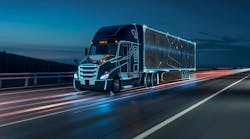Individual truckers and the International Brotherhood of Teamsters are both rallying against the PierPass program being implemented at the ports of Long Beach and Los Angeles on the assertion that it will force truckers to work longer shifts into nights and weekends.
PierPass is a program designed to alleviate port congestion by keeping the ports open until 3 a.m. and on Saturdays starting on July 23. The ports will levy a “traffic mitigation fee” for each container moved during peak hours. This fee is intended to pay for the extended hours of longshore workers as well as provide shippers an incentive to have the containers moved during off-peak hours.
The Teamsters last week issued scathing criticism of the program. The union claimed that in addition to reducing the quality of life for drivers, the program was planned without sufficient feedback from trucking stakeholders.
“Our problems with PierPass is one of implementation and structure,” said Ron Carver, Teamsters deputy director-- port division. “Teamsters has been calling for longer [port operating] hours for a number of years, but this operation was conceived and developed and being implemented without the participation of motor carriers.
“PierPass will result in 10,000 exhausted port truck drivers,” Carver said. “Drivers currently work 12 hours a day. Under this plan they could work between 18- to 20 hours a day. It’s a real hazard when there’s nothing in the [PierPass] plan that does anything to ensure that drivers aren’t forced to work days and nights.”
Because, many owner-operators are now struggling to break even, extending port hours without any provision to ensure drivers don’t work dangerously long shifts can result in a decline in public safety, Carver explained. “They’re going to be forced to work additional time in order to make the minimum sustainable amount of money,” he said. “We’re not opposed to extended hours in principle—we’ve advocated for extended hours for years but there are certain safeguards that have to be implemented and considered. It’s not the same as people working to clean a building— it’s about drivers driving big rigs on public roadways.”
PierPass disagrees with that criticism. "By that reasoning, we shouldn't build highways because someone might break the law and exceed the speed limit," said Patricia Condon, PierPass spokesperson in an emailed statement.
"PierPASS has been conducting an intensive outreach to trucking companies and truck drivers," Condon continued. "Bruce Wargo [PierPass president & CEO] spoke to a standing-room-only crowd at a California Truckers Association meeting in June, and we met with more than 250 truck drivers on June 18 to explain and discuss the program."
Early this week PierPass issued a news release in response to the Teamsters criticism.
“The OffPeak program will deliver important benefits to port drivers,” said Wargo. “While PierPass takes no position on the unionization of port drivers, it is unfortunate that the Teamsters are attacking our progressive solution to port congestion problems.”
PierPass believes the OffPeak program will boost driver earnings by allowing them to complete more turns thanks to the less congestion during nights and on weekends. Trucking companies are looking at additional incentives for drivers to haul containers during OffPeak shifts, PierPass said.
Drivers working off-peak hours will also benefit from improved fuel economy from driving on less-congested highways as well as breathe cleaner air, PierPass said.
“[Our membership] is talking about surcharges for drivers who haul at night,” said Stephanie Williams, vp—California Trucking Assn. “That’s the way they’re going to provide incentives to convince these guys to leave their families at night.”
“Our position is that we were concerned when this [OffPeak program] process was started,” said Curtis Whalen executive director of the Intermodal Motor Carriers Conference of the American Trucking Assns. While the need to decrease turn times has been established, we don’t know whether or not this is going to work. There are also quality of life issues.
“For dockworkers, the funds to generate this for the terminal operations are created by charges assessed to containers during peak hour activity,” said Whalen. “But there’s nothing to pay the trucker-- they’re not getting anything other than the concept that they might make more turns. This is healthy skepticism, but certainly something has to be done because peak times haven’t been pleasant for truckers either.”
Whalen said it’s difficult to predict whether all the benefits of the OffPeak program will come to fruition. Much of it depends on whether the economics work out between carriers and shippers in establishing a premium for off-peak haulers.
“We see a lot of policies where there are surcharges, and that’s to keep the container moving,” said Whalen. “We all appreciate there’s limited space and that increasing turns for truckers is good. But this is simply putting an economic penalty on peak operations. If you don’t work it out you’re pushing this [problem] on a driver resource-limited industry. The problem is just being forced onto trucking— the question is whether we have the resources to solve this problem.”
Finding truckers willing to move freight during the off-peak hours may indeed be a problem, as trucking executives continue to repeat tight capacity and a tapped-out driver pool.
“The big problem is the driver shortage,” said Michael Belzer, associate professor of the University of Michigan Transportation Research. “The shortage is simply the inability to make drivers work for less. In concept, [OffPeak] is a great way to divert traffic off the highway.
“This will be essentially charging nearly double the overall cost of moving the container if you move it during the day,” added Belzer, noting that the traffic mitigation fee is $80 per 40-ft container, which excludes the cost to move the container. “That should have a substantial impact [to save shippers money] if drivers are moving it at night. And if the driver can get in two or three more moves in a night, that’d make him happy. Truck drivers have had some degree of preference for driving at night because it’s less congested— but night hours have a health cost as well. They’re going to need a premium to pay for them to work at night, but part of that may work itself out naturally by enabling them to move more containers.”




